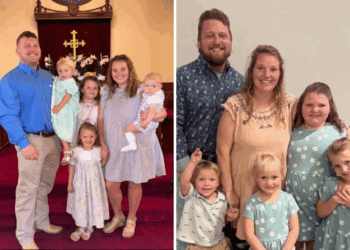Dozens of South Africans arrived in the United States last week after President Trump established refugee status for Afrikaners, the white ethnic minority that created and led the system of racial segregation known as apartheid.
The refugees will play a contentious role at a meeting on Wednesday between Mr. Trump and President Cyril Ramaphosa of South Africa, who has criticized them as “cowardly” and disputed that they qualified for refugee status.
Errol Langton, 48, the patriarch of a South African family of nine that has relocated to Birmingham, Ala., told The New York Times he had been threatened back home because he was “a white guy and a farmer,” and that his business had suffered financially because of the hatred directed at Afrikaners.
“South Africa is a beautiful country, and it breaks my heart that we’ve left,” he said.
Mr. Ramaphosa will get his first chance in person to rebut what he has said is Mr. Trump’s misinformation when he visits the White House on Wednesday. The two leaders are also expected to discuss trade and tariffs.
Who are the Afrikaners?
The Afrikaners who arrived in the United States last week are the descendants of the European colonizers who came to South Africa approximately four centuries ago. They later created the system of apartheid in 1948.
Decades after the end of apartheid, some Afrikaners now say they are being denied jobs and have been targeted by violence because of their race.
“No white person in their right mind would stay in this country,” said Jaco van der Merwe, 52, an Afrikaner living in Johannesburg. “I believe South Africa is finished.”
Mr. Trump claims that Afrikaners are being persecuted and killed. “It’s a genocide that’s taking place,” he said last week. “It’s a terrible thing that’s taking place, and the farmers are being killed. They happen to be white.”
South African police data doesn’t support that claim of mass murder. From April 2020 to March 2024, 225 people were killed on farms in South Africa, according to South African police officials. But many of the victims — 101 — were current or former workers living on farms who tend to be Black. Fifty-three of the victims were farmers, who are usually white.
An independent investigation is the best way to resolve the dispute over the genocide claims, said Vincent Magwenya, a spokesman for Mr. Ramaphosa.
Forty-nine Afrikaners — including parents and children — boarded a flight in Johannesburg to the United States on earlier this month, according to a spokesman for South Africa’s airport authority.
The U.S. State Department said in March that it had received 8,000 inquiries from people seeking information about the refugee program. It is unclear if the U.S. government will admit more families. Since arriving in the United States on May 12, few Afrikaners have publicly spoken about leaving their country, their first impressions of America or what they make of the charged debate over their status as refugees.
Organizations such as the Amerikaners have been set up to help “support disenfranchised South Africans seeking a new future in the United States.” Some leading Afrikaner activists say they would prefer Mr. Trump help their cause at home rather than offer refugee status in the United States.
What does land have to do with it?
Much of the discontent among Afrikaners centers on their experience in rural communities and frustration over land ownership.
Many Afrikaners farm to make a living. During apartheid, the government denied Black South Africans the right to own prime agricultural land. That meant that almost all of the country’s large-scale commercial farms were white-owned enterprises. This remains true today.
Although white South Africans make up only 7 percent of the population, they own farmland that covers about half the country. The South African government has tried to address this inequality with various land reform programs, including the recent Expropriation Act, which allows the government to acquire privately owned land in the public interest without providing compensation to the owner.
When Mr. Trump signed the executive order announcing his plans to resettle “Afrikaner refugees,” he said it was because the South African government had created a system that “racially disfavored landowners.”
Why are Afrikaners being granted refugee status?
Refugees can often wait years before they are processed and approved to travel to the United States. The Afrikaners who arrived on May 12 had to wait no more than three months.
The president has equated efforts by the South African government to undo racial inequalities to anti-white discrimination.
South African officials have described the administration’s moves as politically motivated. Mr. Trump has criticized the South African government for its ties to Iran and for bringing a genocide case against Israel at the International Court of Justice over the war in Gaza.
“It is most regrettable that it appears that the resettlement of South Africans to the United States under the guise of being ‘refugees’ is entirely politically motivated and designed to question South Africa’s constitutional democracy,” Chrispin Phiri, a spokesman for the South African government, said in a statement.
How will they be resettled in the United States?
Mr. Trump said on Monday the United States would grant citizenship to the Afrikaners.
The administration plans to rely on a refugee office in the Department of Health and Human Services to assist with resettlement.
According to a memo from the Department of Health and Human Services, the administration plans to help the Afrikaners find “temporary or longer-term housing” and “basic home furnishings, essential household items and cleaning supplies.”
John Eligon is the Johannesburg bureau chief for The Times, covering a wide range of events and trends that influence and shape the lives of ordinary people across southern Africa.
Eduardo Medina is a Times reporter covering the South. An Alabama native, he is now based in Durham, N.C.
The post White South Africans Granted Refugee Status by Trump: What We Know appeared first on New York Times.




